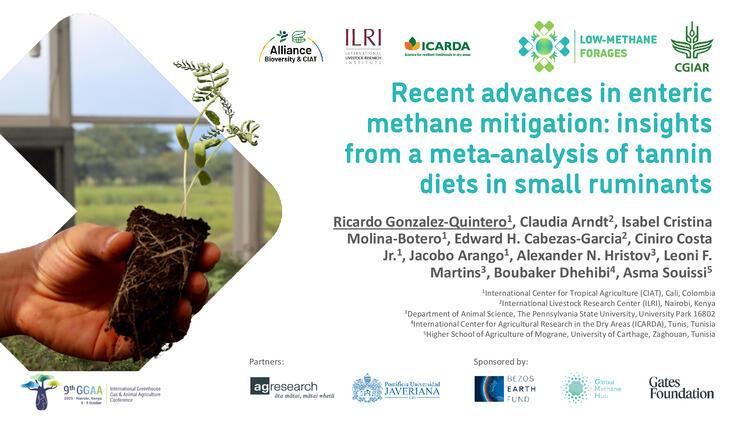
Ruminants play an important role in global food systems, particularly within smallholder farming systems that support over 600 million people globally. However, livestock are significant contributors to global methane emissions, accounting for over 32% of all anthropogenic methane. Under business-as-usual scenarios, these emissions are likely to increase as demand for livestock products rises, driven by a growing population and a projected 40% increase in global per capita income by 2050, which is expected to fuel greater consumption of animal-based products. Addressing this challenge is critical to reducing greenhouse gas (GHG) emissions while maintaining livestock productivity. The Low-Methane Forages (LMF) project, led by three CGIAR Centers (Alliance Bioversity-CIAT, ICARDA, ILRI), addresses these challenges by promoting Antimethanogenic Compounds (AMC)-rich forage legumes, breeding methane-reducing traits into forage crops, and deploying these solutions in livestock systems across the Global South. By integrating innovative forages, the project aims to mitigate climate impacts while sustaining ruminant productivity and food security. To support this process, this meta-analysis evaluates the effectiveness of tannin-containing diets in reducing enteric methane emissions in small ruminants, based on a systematic review of peer-reviewed studies published between 1972 and 2024. Boolean search strings containing combinations of the words enteric methane, goat, sheep, small ruminant, condensed tannin, tanniferous forages, and secondary compounds were applied in the Web of Science database. A total of 19 studies were retrieved, including 230 treatment and control mean comparisons for daily CH₄ emissions and 160 comparisons for CH₄ yield per kilogram of dry matter intake (DMI). Methane emissions were analyzed by extracting data on daily methane output from the selected studies, which utilized standard respiration chamber techniques, portable gas analyzers, or in vitro fermentation methods, depending on the study. Results demonstrate that tannin-containing diets decrease daily methane emissions and methane yield (g kg DMI-1) by 8.9% (P=0.001) and 15.3% (P<0.001), respectively. Moreover, Productivity, measured as average daily gain (ADG), was generally maintained with small, non-significant increases in most studies; a few reported minor non-significant decreases, but no statistically significant decline was observed. In addition, treatments integrating tannin-rich roughages demonstrated simultaneous daily methane emissions reductions (-11.13 ± 4.26%, P<0.001). These results support the conclusion that tannin-containing diets reduce methane emissions while maintaining or even increasing feed intake (DMI). High heterogeneity in the dataset (I2=95.1) highlights the variability in tannin efficacy across studies, influenced by factors such as tannin concentration, forage type, animal management practices, and geographic region. Subgroup analyses indicate that dose-dependent effects are critical in determining methane reduction potential, underscoring the importance of balancing tannin concentrations to achieve maximum mitigation while minimizing the risk of potential adverse impacts on feed intake and digestibility. These subgroup analyses revealed that condensed tannins showed inconsistent effects on daily methane emissions, with a mean difference close to zero and no statistical significance (P ≈ 0.9). Average daily gain (ADG) was generally maintained, showing small, non-significant increases on average. While tannin-containing diets show promise in reducing methane emissions and maintaining productivity, the variability and uncertainty in their efficacy highlight the need for further research to optimize their application in sustainable livestock management.

